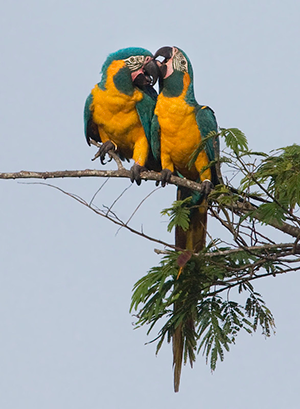What’s in a Name? That’s Wagler’s Macaw to You
 By Brian Kluepfel
By Brian Kluepfel
The blue-throated macaw is feted with names for its color (the blue throat patch distinguishes it from the commoner blue-and-gold), a noted scientist (Wagler) and for a native place-name (Caninde-yu – “macaw-yellow” in Guarani – is also a town in Paraguay).
Avian namesake Johann Georg Wagler was born in Nuremburg in 1800. He didn’t actually travel to Brazil with Johan Spix, for whom a more famous blue parrot is named. (Perhaps you’ve seen Rio? Blu is based on the near-extinct Spix’s macaw.)
But Wagler was Spix’s man-behind-the-scenes in the museums of Germany, processing the latter’s collections and first describing for Europeans this lovely family of birds. (In the year of his death, his notable “Monographia Psittacorum” was published.)
Johann’s true love was reptiles, but in honor of his work with birds, the blue-throat got its first common European name. (In Spanish-speaking Bolivia, it’s known by yet another, barba azul, or bluebeard. That’s quite a cool moniker.)

Whatever its name, the bluebeard is in grave danger. Once known across parts of Paraguay and Argentina as well as Bolivia, it’s now only found in one small corner of grasslands near Trinidad. Cattle ranching has decimated its favored palm tree habitat, and until recently poachers and indigenous feather-gatherers did their damage, too.
But there’s hope. In 2016, I met Tjalle Boorsma of Armonía, Bolivia, who manages big tracts of land across the country, including Reserva Barba Azul. They work with local ranchers in preserving habitat while grazing herds of cattle as well. Artificial nest boxes supplement the disappearing palm trees, and breeding surveys have shown a slight uptick. Native groups now make ceremonial headdresses from artificial, not macaw, plumes.
Wagler died at 32 years old of an accidental gunshot wound while hunting, an ironic demise for someone who spent so much of his life cataloging fallen carcasses “collected” as specimens. His legacy lives on in the many birds and reptiles he studied, a handful of which bear his name.
Call it what you like, but if Wagler’s namesake parrot disappears in the mists of extinction, we have only ourselves to blame.
Common Name: Blue-throated macaw (aka Wagler’s macaw, aka Canindé macaw, aka barba azul) Scientific Name: Ara glaucogularis previously Ara caninde
Habitat: North-central Bolivia
Estimated population: 300-400
Brian Kluepfel is an author of Lonely Planet travel guides and other renowned publications, as well as editing the Saw Mill River Audubon’s newsletter. This piece originally appeared in his blog, birdmanwalking.com.

